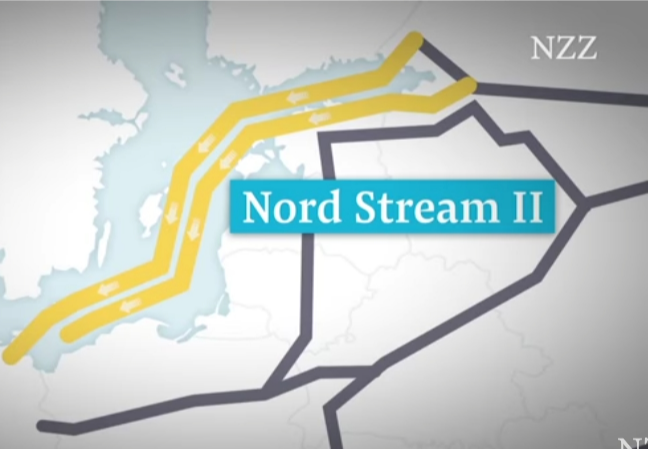U.S. Lawmakers to Germany: Russia’s Nord Stream Pipeline a “Bad Deal”

In a rare showing of bipartisan consensus, several U.S. lawmakers have called upon Germany to reconsider the Nord Stream 2 pipeline project, the German broadcaster Deutsche Welle reported. “For once, Democrats and Republicans in the US agree on something: The project is a really bad idea,” the public broadcaster added.
In February, the European Union had revised its energy guidelines to approve the Nord Stream 2 project, a 760-mile Baltic Sea pipeline that upon completion will link Russia to Germany. Close to 60 percent of the project has already been realized, the oil and gas journal Offshore reports.
German broadcaster Deutsche Welle reported the comments made by the U.S. lawmakers:
Neither Republican nor Democratic lawmakers are shy about voicing their opinion on the proposed project. “Putin’s pipeline is a trap,” Wyoming Republican Senator John Barrasso told the energy and environment website E&E News in May, adding: “Germany seems to be willing to put its head in the noose. I think it’s a terrible mistake.”Recently, Democratic Senator Jeanne Shaheen of New Hampshire joined forces with Republican Senator Ted Cruz of Texas to put forth a bill that would sanction companies involved in building the pipeline. Shaheen claims Russia is looking to use cheap gas as a way to monopolize the European energy market, threatening stability in the region. She says the US cannot simply look the other way “while the Kremlin builds this Trojan horse.”Grigas also has concerns about the project. “Nord Stream 2 is a bad deal for Europe and for Germany. It would strengthen Russia’s political influence in Germany and allow the flow of corruption into Europe,” she said.Grigas added that Germany’s efforts to bring about peace in Ukraine, while at the same time putting cash in Kremlin coffers with Nord Stream 2, is a paradox. She said Germany must wake up to the fact that there are “more gas exporters” on the market today, and that Berlin doesn’t have to make itself dependent upon Russia to cover its energy needs.
Germany is the biggest consumer of Russian gas. Berlin’s dependence on Moscow is expected to grow as Chancellor Angela Merkel embarks on her radical green energy plan, or the Energiewende, sweeping aside conventional power stations to make way for renewable energy sources.
But Chancellor Merkel’s ambitious ‘green new deal’ is widely expected to fail, leaving Germany vulnerable to Russian blackmail. “The state has redistributed gigantic sums of money … to the operators of renewable energy facilities. But without the subsidies, operating wind turbines and solar parks will hardly be worth it anymore,” German weekly Der Speigel noted last month. “Soon, the coal- and natural gas-fired power plants that have traditionally been used to maintain grid stability in such periods will no longer be there, and a solution must quickly be found to address the issue.”
“European Union reliance on Russian gas presents risks for Europe and the West as a whole and makes us all less secure,” U.S. Ambassador to Germany Richard Grenell wrote in a guest column for the Deutsche Welle earlier this year.
In Europe, Poland is the most vocal critic of the Nord Stream on the grounds of national security. Watching Germany and Russia hobnobbing once again raises historic anxieties among the Poles.
The pipeline “should not be realized,” Polish President Andrzej Duda told his German counterpart Frank-Walter Steinmeier during a visit to Berlin last October. Berlin and Moscow were “tighten(ing) the noose around our neck with the help of Nord Stream 2,” the former Polish Defense Minister Antoni Macierewicz was quoted saying by a Russian state broadcaster last year.
President Donald Trump also considers Russia’s Baltic Sea pipeline a threat to the European security. “Germany, as far as I’m concerned, is captive to Russia because it’s getting so much of its energy from Russia,” President Trump said during the last year’s NATO summit in Belgium. Germany pays “billions of dollars to Russia, and we have to defend them against Russia,” he added referring to Russo-German pipeline project.
Russia’s state-controlled energy giant Gazprom holds a 51 percent stake in the Nord Stream. German energy companies Wintershall Dea GmbH and PEG Infrastruktur AG hold over fifteen percent each.
It’s not just Germany’s energy sector, though. The political elite in Berlin are embedded in Moscow’s strategy to dominate Europe’s energy market as well. Former German Chancellor, and Merkel’s immediate predecessor, Gerhard Schröder is the chairman of Nord Streams AG, the state-held Russian company building the multi-billion euro pipeline.
Trump: Germany is a ‘captive of Russia’
[Cover image via YouTube]
CLICK HERE FOR FULL VERSION OF THIS STORY